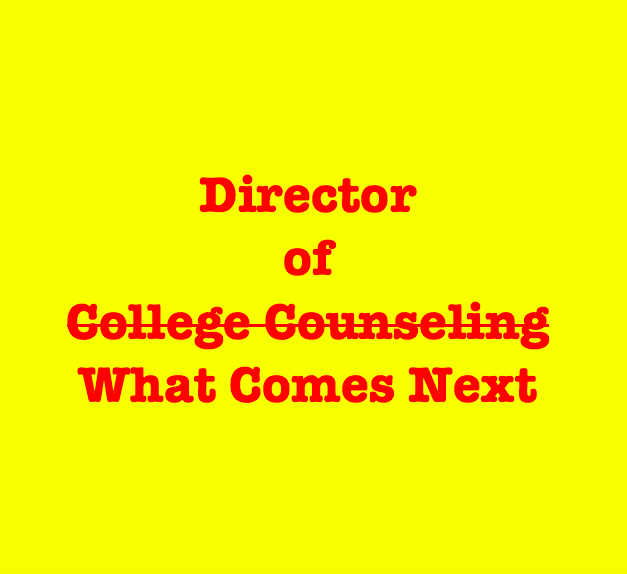 To those teens and their loved ones who have placed their worth in the hands of a college admissions officer, we are here to remind you that you are so much more than an acceptance letter.
To those teens and their loved ones who have placed their worth in the hands of a college admissions officer, we are here to remind you that you are so much more than an acceptance letter.
The Square That Defined Me: Jen’s Story
My high school had its own version of the Instagram commit page before Instagram even existed – a bulletin board boasting a mosaic of senior names and the college they planned to attend. It lived in a heavily trafficked hallway where, multiple times a day, thousands of teenagers passed by with an insatiable curiosity to find out where their peers would be going. I lived in a community that instilled the importance of my name attached to a university’s name. The small square had an unspoken meaning that carried a heavy weight. I still have my square decorated in my college’s colors.
I believed one little square defined all my hard work in high school. I applied but was not admitted early decision. In December of my senior year, I watched my friend’s names populate the board. Yale. Williams. Harvard. Brown. Penn. I watched, holding my deferral letter in my hands, questioning what was wrong with me. I waited until the spring for my square to appear, and when it did, I felt like I couldn’t participate in the prestige parade in the same way as my peers. The university name was posted, and little did I know, this core memory would shape my values, impacting my career choices and my intentions for my future family. I walked through the next two decades of my life slightly less confidently. Looking back, my story led me to major in cultural anthropology (which I would never change); I think in part to understand people’s life stories and how the culture of one’s life, down to the smallest moments in a high school hallway, could send rippling effects through their lives.
As a school counselor, I see the weight that my students carry. While I cannot change the relentless pursuit of prestige alone, I am working to shift the narrative for future generations. It’s time we celebrated college acceptance for the right reasons. Let’s teach our students to define what is important to them and discover universities that share those same values. Let’s make an Instagram page celebrating students’ discovered values and authentic identity. Let’s skip the prestige parade. In fact, let’s protest it.
Rolling Out The Red Carpet For All: Jared’s Story
One of the most powerful lessons I have learned as a college counselor happened in 2010 when I was working for a non-profit organization in Philadelphia. One of my students was anxiously waiting to hear if she had been admitted early to Yale.
Together, we made a plan.
On the day decisions were released, we would use a code to share the results. Our plan was to go for ice cream. If she arrived at my office and said “vanilla,” I knew that the results would not be what she had hoped for. “Vanilla” meant that we wouldn’t talk about it, but we would walk to the closest ice cream shop and feel our feelings as we ate three or four scoops. “Chocolate” meant that Yale said yes. We would still get ice cream, just with a little more pep in our step as we walked down the block.
I’ll never forget the day she came to my office, stood by my desk, and simply said, “Chocolate.”
I screamed. I jumped out of my chair, gave her a hug, and danced around my office, cheering. We ate ice cream and celebrated her accomplishment. She was my first student to be accepted to an Ivy League university.
The lesson came less than 48 hours later.
One of my other students popped by my desk.
“Where’s my ice cream?”
“I’m sorry, what do you mean?” I replied.
The student reminded me that she had been accepted to the junior college in our area the week before. She asked why she, too, didn’t get hugs, cheers, and ice cream. I felt so small in that moment, deservedly.
That day, I learned a powerful lesson, one I share with my graduate students every year. I now roll out the red carpet for every student. Every achievement matters. We shouldn’t only applaud our students when they are accepted to colleges that society has deemed “prestigious.” It’s time we shift the narrative and help our students see they are worth much more than an acceptance letter.
Reframing the College Conversation: Tools for a Values-Centered Approach
“Why do you want to attend [insert prestigious school name]?”
The student shifts in their chair and nervously looks at their family, “Because it is a good school.”
We press with curiosity. “What makes it a good school?”
The student clears their throat and looks over again at their parents, “Because it’s ranked high.”
“How does the ranking support your growth and help you meet your goals more than another school?”
Silence. There is almost always silence.
With more than 30 years of collective experience, we have pushed students and families to answer these types of questions, embracing the uncomfortableness that follows. Often, we are led to believe that a name equals success. It’s time we question this idea and embrace what truly matters: finding a college that sparks your student’s passion, nurtures their growth, and sets them up for a fulfilling life. When we speak with families about their hopes for their students, more often than not, they name happiness, physical and mental well-being, individual growth, the ability to face challenges and solve problems, and kindness toward others.
The college admissions process is a whirlwind. For parents and teens alike, it’s easy to get swept up in prestigious institutions’ rankings, reputation, and allure. However, this narrow focus can overshadow what really matters. Worse, the pressure surrounding college admissions has a significant and detrimental effect on mental health.
First, we invite you to consider how parents can unintentionally increase their children’s anxiety:
1. Prioritizing results over the learning process: Focusing on grades, scores, and rankings rather than the effort and growth a child demonstrates can create pressure and undermine the joy of learning.
2. Equating worth with achievement: Defining a child’s value by their academic or extracurricular performance neglects the importance of curiosity, intrinsic motivation, and emotional development, which are stronger predictors of long-term success.
3. College is a stepping stone, not the ultimate goal: While college is one of many bridges to a fulfilling life and career, it is not the ultimate goal. Instead of solely focusing on college admission, students should view their education as a means to set themselves up for long-term success in both their personal and professional lives. We must encourage students to think beyond their college years and consider how their education will contribute to their overall life goals and values. College is just one chapter in a person’s life story, and it’s crucial to keep the bigger picture in mind.
4. Oversimplifying with labels: Using terms like “good/bad school” or “high/low score” creates an all-or-nothing mindset that fuels anxiety and ignores the nuanced reality of each student and their learning journey.
5. Overemphasizing achievement in conversations: When academic discussions dominate parent-teen interactions, it overshadows other important aspects of well-being, such as emotional health and personal interests.
By becoming aware of these tendencies, parents can shift their approach to foster a healthier, more supportive environment that reduces anxiety and promotes the holistic development of their children.
The Values-Driven Approach
Instead of fixating on getting into “the best” school, help your teen focus on finding the “best fit” school. Shift the conversation towards exploring their values, interests, and what kind of environment would allow them to thrive.
Here’s a framework for a values-driven approach to the college search:
1. Self-Reflection: Encourage thoughtful introspection with questions like:
- What makes you feel excited and energized?
- When do you lose track of time because you’re so engrossed in something?
- What kind of people do you want to surround yourself with?
- What kind of impact do you want to have on the world?
2. Defining “Best Fit”: Use those reflections to consider their ideal college environment:
- What kind of extracurricular scene excites you most: Division 1 sports, quirky clubs, or a thriving arts community?
- What kind of weather and outdoor activities do you picture yourself enjoying during your college years?
- What kind of student support services do you think you’ll need to thrive academically and personally?
- Do you learn best through hands-on projects, discussion-based seminars, or traditional lectures?
- In terms of size, do you see yourself at a college where you’ll recognize most faces or one where you can blend into the crowd?
3. The Search – Broadening Horizons
- Lean into resources like Forget The Rankings: The Values-Driven College Search to think beyond prestige and find hidden gems.
- Embrace Exploration: Visit a variety of schools, not just the usual suspects. Never heard of a school? Give it a chance!
- Do more than tour. Sit on campus. Observe the students. Try to catch the vibe.
- Talk about values with your teen. What do you value? How is that reflected in your career? How do the colleges you are considering connect with the things your teen values?
- Student Voices: Read student blogs, campus newspapers, and social media for real student perspectives on campus life.
By shifting the college conversation from prestige to values, you equip your students to make a well-informed, self-assured decision. They’ll find a place where they can learn with joy, form meaningful connections, and prepare for a life filled with purpose.
—–
 Jared Epler has worked as a counselor for over 15 years in K-12 schools, higher education, community-based organizations, and private mental health practices. Jared specializes in career and college counseling for youth and adults, mental health counseling, and burnout and self-care in helping professions. He currently works as a public high school counselor, is an adjunct faculty member at the University of Pennsylvania, and is a co-founder of Forget The Rankings: The Values-Driven College Search.
Jared Epler has worked as a counselor for over 15 years in K-12 schools, higher education, community-based organizations, and private mental health practices. Jared specializes in career and college counseling for youth and adults, mental health counseling, and burnout and self-care in helping professions. He currently works as a public high school counselor, is an adjunct faculty member at the University of Pennsylvania, and is a co-founder of Forget The Rankings: The Values-Driven College Search.
 Jen Vallieres has worked in education and counseling since 2007, when she began her career in Jackson Hole, Wyoming. She has worked with students from preschool through high school in school settings, community-based organizations, and community mental health organizations. She works with youth and adults and specializes in general mental health counseling and college/career counseling. Currently, Jen is a high school counselor and co-founder of Forget The Rankings: The Values-Driven College Search.
Jen Vallieres has worked in education and counseling since 2007, when she began her career in Jackson Hole, Wyoming. She has worked with students from preschool through high school in school settings, community-based organizations, and community mental health organizations. She works with youth and adults and specializes in general mental health counseling and college/career counseling. Currently, Jen is a high school counselor and co-founder of Forget The Rankings: The Values-Driven College Search.
 Hey Seniors – greetings from the College Guy!
Hey Seniors – greetings from the College Guy! WGCU Public Media in Florida followed six high school students who worked hard to earn a seat at America’s top colleges – and now you can too in the short documentary Dream School.
WGCU Public Media in Florida followed six high school students who worked hard to earn a seat at America’s top colleges – and now you can too in the short documentary Dream School.
 There is no doubt that something is very broken in American secondary and tertiary education. Over each of the last fourteen admissions cycles, I have helped students from around the corner and around the world navigate the college admissions process and tackle the full time of job of applying to American colleges and universities.
There is no doubt that something is very broken in American secondary and tertiary education. Over each of the last fourteen admissions cycles, I have helped students from around the corner and around the world navigate the college admissions process and tackle the full time of job of applying to American colleges and universities. Yet, most of all, I will feel great for the young men and women I work with every day because once they see a four-year college or university is not the be all end all, maybe some of them will calm down, drop out of a few of their extracurricular activities, and use their spare time to pick up and read a book like Great Expectations or Candide or go on YouTube and watch for free the full thirteen installments of Civilisation: A Personal View by Kenneth Clark. There is no doubt that after doing so students will be closer to gaining a healthy perspective on life than they ever could playing America’s obscene college admissions game.
Yet, most of all, I will feel great for the young men and women I work with every day because once they see a four-year college or university is not the be all end all, maybe some of them will calm down, drop out of a few of their extracurricular activities, and use their spare time to pick up and read a book like Great Expectations or Candide or go on YouTube and watch for free the full thirteen installments of Civilisation: A Personal View by Kenneth Clark. There is no doubt that after doing so students will be closer to gaining a healthy perspective on life than they ever could playing America’s obscene college admissions game.



